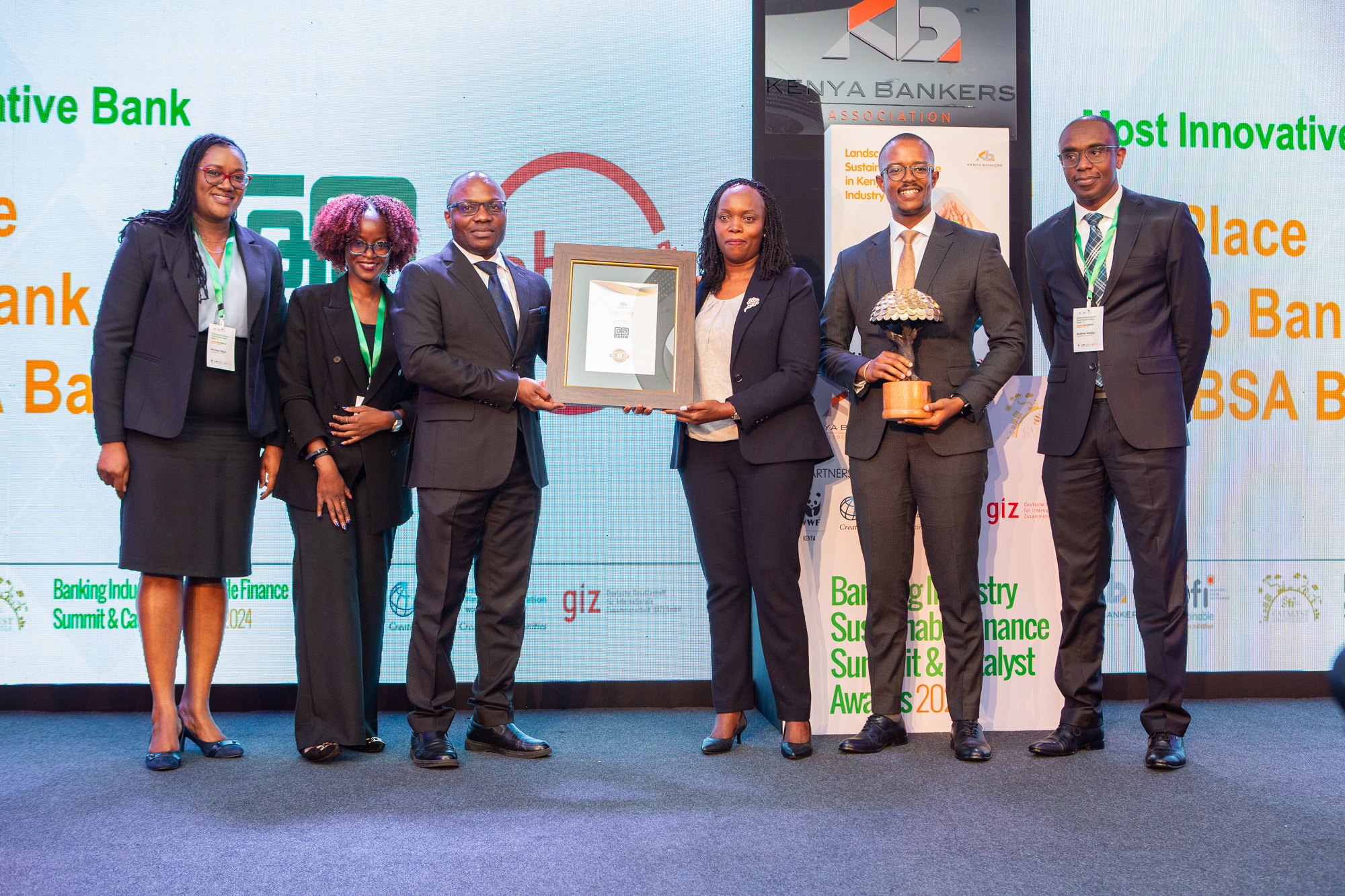Coop Bank team comprising Head of investor Relations & Strategy Veronica Njore, ESG Analyst Euginia Nyamongo, Manager, Investor Relations & Strategy Ben Muriuki, Director Finance & Strategy Caroline Karimi and Director Transformation Andrew Wanjau with trophy haul at this year’s Sustainable Finance Catalyst Awards where Coop Bank was named the Overall Winner
The Kenya Bankers Association (KBA), in collaboration with IFC and WWF Kenya have today launched the revamped Sustainable Finance Guiding Principles and the Landscape of Sustainable Finance in Kenya’s Banking Industry Report as part of ongoing efforts to deepen financial inclusion and sustainability within Kenya’s financial services sector.
Developed with IFC’s support, the revamped Sustainable Finance Guiding Principles provide a robust framework for banks to integrate Environmental, Social, and Governance (ESG) considerations into their operations. Alignment with global standards fosters responsible lending, sustainable investments, and innovative financial solutions that address Kenya’s socio-economic and environmental challenges.
“Sustainable business models and green financing are not mere trends—they are essential pathways for ensuring long-term economic stability and environmental stewardship. By integrating sustainability into our lending and investment decisions, we can help mitigate climate risks, support green projects, and grow our economies while safeguarding the future of our planet.” – Betty Korir, Kenya Bankers Association Vice Chairperson.
The Landscape Report, supported by WWF-Kenya, highlights key achievements and challenges in sustainable finance. The report indicates that gross loans across 11 key sectors grew by 23 percent since 2020, reaching Sh3.6 trillion in 2022, with MSMEs receiving Sh783.3 billion. However, the report cites challenges such as high costs for sustainability-linked bonds, inconsistent sustainability reporting, and limited data standardization persist. The report identifies opportunities for further investment in green growth sectors, including agriculture, energy, water, manufacturing, and real estate.
“The Sustainable Finance Initiative has enabled over 50,000 bank employees to make lending decisions that benefit the environment, society, and economy. With the revamped guiding principles, the banking industry is better equipped to adopt best practices in governance and risk management, further driving innovation and financial inclusion.” – Raimond Molenje, KBA Ag. CEO
‘’Kenya is endowed with rich natural resources, a dynamic entrepreneurial spirit, and a robust financial sector that provides a unique platform to champion sustainability. However, with these opportunities come significant responsibilities to adopt an integrated approach that aligns economic activities with the sustainable development agenda. WWF-Kenya will continue to collaborate with the Kenya Bankers Association because we believe in a future of financial prosperity grounded in sustainability – a safe legacy that connects people, nature, and the economy.’’ Mohamed Awer, WWF-Kenya Chief Executive Officer.’’
‘’Application of the SFI principles is important for Kenyan banks as it will promote financing for renewable energy, energy efficiency, sustainable agriculture, and other eco-friendly projects. It will also encourage banks to support projects that enhance social inclusion, gender equality, affordable housing, healthcare, and education. Finally, it will help banks manage environmental and social risks, making informed decisions to protect financial stability’. Mary Potter Peschka, IFC Regional Director.
We recognize that climate change impacts how financial institutions perceive risks, especially in the agricultural sector. Therefore, our partnership will enable financial institutions to implement sustainable financing options such as blended finance for investments into nature-based solutions that benefit the planet, beneficiaries, and the financial institutions.’’— Sophia Baumert, Project Manager, Sustainable Agricultural Systems and Policies (AgSys)
During the summit, 26 banks were recognized for their excellence in adopting sustainable finance practices with 1st place going to Cooperative Bank, 2nd place to KCB Bank and 3rd place going to ABSA Bank in the Overall winner’s category.
In the specific winner’s category, the Best in Sustainable Finance went to KCB Bank followed by ABSA Bank and NCBA Bank. In the Best-Case Study Retail MSME category, Cooperative Bank was 1st, National Bank of Kenya 2nd, and Sidian Bank 3rd.
The Best Client Case Study Commercial, Cooperative Bank was 1st, KCB Bank 2nd, and Stanbic Bank 3rd. Best Bank Case Study Bank Operations was won by Diamond Trust Bank, followed by Cooperative Bank with I&M Bank coming in 3rd. For the Best Client Case Study in Promoting Gender Inclusivity KCB Bank nerged tops with KWFT Bank and Cooperative Bank taking 2nd and 3rd places respectively.
The Best Bank Case Study in Promoting PWD Accessibility was taken by KCB Bank, followed by ABSA Bank & CO-OP Bank who tie in 2nd place with DIB Bank coming 3rd. For the most Innovative Bank, ABSA Bank & CO-OP Bank tied for 1st place follwoed by Equity Bank in 2nd and I&M Bank in 3rd place.
The most Improved Bank was DIB Bank Kenya folowed by DTB Bank and Credit Bank. In 2024, a total of forty-nine entries were submitted by banks, an increase from forty-three in the year 2023.
